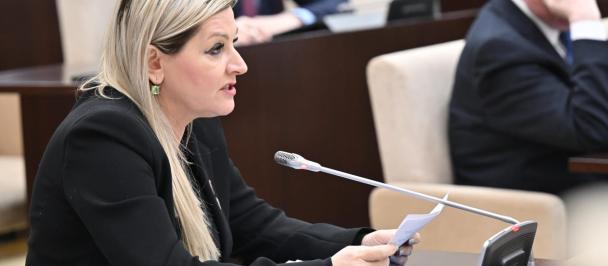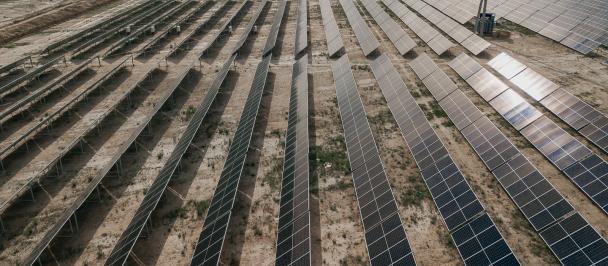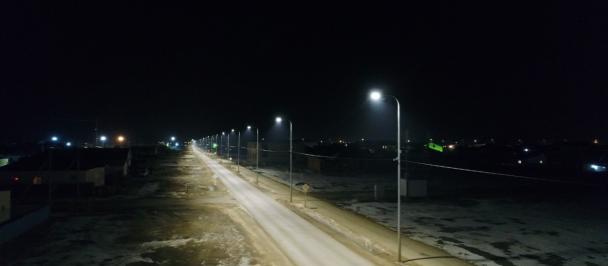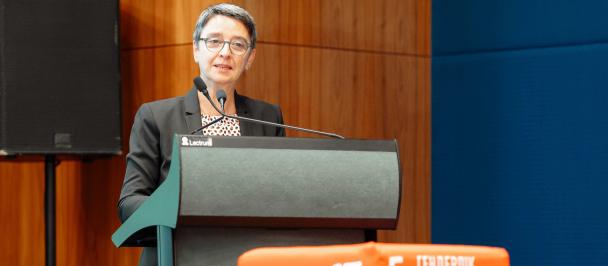SDG 7 and the 2030 Agenda: an EU-funded Regional SDG Platform for Central Asia launched
February 23, 2024

Today, the prospects of Kazakhstan's transition to a green economy were discussed at the Parliamentary Commission meeting on monitoring the implementation of national goals and tasks in sustainable development. The meeting was attended by the UNDP Resident Representative in Kazakhstan, members of the Senate and the Majilis, Ministers of energy, ecology, and natural resources, representatives of regional administrations, and civil society organizations.
The discussion focused on Kazakhstan's progress towards achieving Sustainable Development Goal 7, which aims to ensure access to affordable, reliable, sustainable, and modern energy sources for all. This goal includes five tasks and six indicators, just three of which Kazakhstan aims to achieve by 2030.
Leaping towards the Goals
Maulen Ashimbayev, the Speaker of the Senate, commenced the meeting by highlighting the global challenge of providing everyone with affordable, reliable, sustainable, and modern energy sources. In Kazakhstan, this issue is compounded by the worsening state of the power grid. Consequently, there is an increasing need to prioritize alternative energy sources and develop a comprehensive strategy for transitioning to a “green economy.”
“Although people can access electricity, the power grids are experiencing wear and tear, and our country needs to make large-scale investments in electricity production. It's also important to gasify our country. Unfortunately, we still rely heavily on non-renewable energy sources, which is a problem. The President has identified the development of a “green economy” as a top priority. By transitioning, we can improve the quality of life of our citizens and become a more active player in the global community while reducing the burden on the environment and using natural resources more sustainably. The deputies have made it a priority to contribute to achieving these goals,"said Ashimbayev, calling on to consolidate efforts towards achieving the Goals.
Where UNDP stands
The successful implementation of sustainable and low-carbon infrastructure depends on proper financing. In Kazakhstan, UNDP has deployed innovative tools like energy efficiency subsidies, green bonds, and carbon offsetting to stimulate private sector investments, mobilizing over US$half a billion s for green projects. However, given high-interest rates in banks, increased state support for green small and medium-sized enterprises and diversified finance instruments are needed.
“Target 7.2 indeed serves as a crucial accelerator for advancing the entire SDG agenda within the country. Renewable and clean energy not only support the transition to a low-carbon economy but also play a key role in mitigating climate change by reducing greenhouse gas emissions and minimizing the negative impact of rising energy prices on the most vulnerable segments of the population. Prioritizing this target can have significant positive impacts across multiple SDGs,”highlighted Katarzyna Wawiernia, UNDP Resident Representative in Kazakhstan.

Kazakhstan possesses abundant untapped renewable energy resources, and initiatives like the introduction of site-specific auctions have led to historically low prices for solar energy. Despite this success, integrating renewable energy into the grid poses challenges such as intermittency and grid stability, requiring significant investments in flexible storage capacities. UNDP supports amendments to legislation to promote small-scale renewable energy technologies, which can alleviate pressure on the grid.
One tool to monitor them all
During the meeting, the Regional SDG Monitoring Panel was officially launched. It has been developed within the framework of the UNDP programme funded by the European Union to establish a Regional SDG Platform for Central Asia. The panel has been designed to monitor various aspects related to SDGs, such as trends, policies, interconnections, and financing. It aims to provide a comprehensive regional outlook that gives users a holistic view of the progress towards SDGs in Central Asia. Users can “zoom in and out” to look at specific indicators and understand the interconnected nature of the SDGs. This allows them to see how actions to achieve one goal can impact others, thus contributing to the 2030 Agenda.
The current data set for Central Asia includes approximately 1,500 interactions obtained through various channels. The panel also assesses the effectiveness of European Union-funded projects to achieve the SDGs in Central Asia. It collects database information, compares it with reference countries, identifies data gaps, and visualizes the findings. This unique tool allows government agencies, non-governmental organizations, and stakeholders to assess the progress toward achieving the SDGs and identify challenges and opportunities.
Moreover, through this panel, citizens of Central Asian countries can identify the necessary steps to achieve the SDGs and contribute to creating a brighter and sustainable future. The Regional SDG Monitoring Panel is expected to play a crucial role in achieving the SDGs in Central Asia.
A sustainable future is within our grasp
UNDP globally manages a vast portfolio of grant financing totaling $4.9 billion that supports sustainable energy, buildings, transport, industry, agriculture, and biodiversity projects in 137 countries and territories worldwide. This funding has been leveraged to generate an additional $21 billion, directly benefiting 86 million people and indirectly benefiting 111 million more.
Having worked with governments for many years to promote green and low-carbon development, UNDP is well-equipped to provide policy expertise and support to the Government of Kazakhstan as it transitions to cleaner energy sources. Our goal is to assist the government in implementing this transition in an economically viable and socially equitable way.
***
The partnership between the EU and UNDP carries immense significance for Kazakhstan and the Central Asian region at large. By combining the EU's resources, technical expertise, and commitment to promoting stability and prosperity alongside the UNDP's deep understanding of local dynamics and development challenges, this collaboration has become a catalyst for positive change. Their joint efforts address critical issues such as sustainable economic development, inclusive governance, environmental sustainability, and social resilience in Kazakhstan and Central Asia. This partnership underscores the importance of regional cooperation and international solidarity in advancing the collective goal of achieving sustainable development and improving people's lives in the region.
This publication was funded by the European Union. Its contents are the sole responsibility of UNDP and do not necessarily reflect the views of the European Union.

 Locations
Locations



